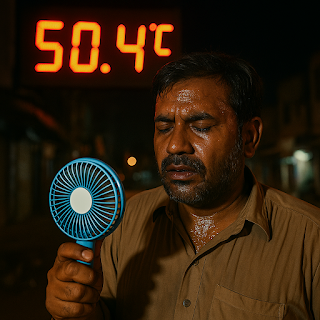Jacobabad Becomes World’s Hottest City with 50.4°C Temperature Even After Midnight
Jacobabad, Pakistan – June 14, 2025: The city of Jacobabad has once again made global headlines, recording a scorching temperature of 50.4°C late into the night, making it the hottest place on Earth even after midnight.
Extreme Heat Grips Pakistan
Jacobabad’s unbearable temperature was recorded around midnight, sparking global concern. This is not an isolated incident. Other cities across Pakistan, including Sibi, Dera Ismail Khan, Bahawalnagar, and even Karachi, have reported heat index values exceeding 47–50°C in recent days. Lahore also experienced intense heat with a ‘feels like’ temperature of 49°C, despite actual readings around 44°C.
What Makes This Heatwave So Dangerous?
- No Nighttime Relief: Nighttime temperatures hovering around 50°C prevent the human body from cooling down, increasing the risk of heatstroke.
- High Humidity: The ‘feels like’ or heat index rises due to humidity, making the heat more dangerous than what thermometers show.
- Overburdened Infrastructure: Increased demand for electricity (due to air conditioners and fans) causes power shortages and water supply issues.
- Health Risks: Vulnerable groups—children, elderly, and outdoor laborers—are at the highest risk of heat-related illnesses and even death.
Climate Change Connection
This heatwave reflects a dangerous pattern linked to global climate change. As greenhouse gas emissions increase worldwide, South Asia faces rising frequencies of extreme weather. Pakistan, in particular, is among the top ten countries most vulnerable to climate-related disasters.
Experts warn that cities like Jacobabad could reach “wet-bulb temperatures” above 35°C, a level beyond which the human body cannot survive for more than a few hours, even in the shade with water.
Historic Temperatures in Jacobabad
Jacobabad is no stranger to deadly heat. In 1919, it recorded a temperature of 52.8°C, which still stands as one of the highest ever documented in Asia. However, the recent 50.4°C temperature measured during nighttime is a chilling sign of worsening climate trends.
Impact on Daily Life
Daily routines have come to a halt. Schools are closing early, markets are deserted by noon, and hospitals are reporting more cases of dehydration, heat exhaustion, and fainting episodes. The government has issued health advisories, urging citizens to:
- Stay indoors between 11 a.m. and 5 p.m.
- Drink water frequently, even if not thirsty.
- Avoid caffeinated and sugary drinks.
- Use wet towels, fans, and cooling methods indoors.
What Needs to Be Done?
This unprecedented situation requires urgent attention from both the government and the public. Here’s what needs to be done:
- Emergency Cooling Centers: Establish temporary shelters with ACs for the poor and vulnerable.
- Public Awareness: Launch radio and TV campaigns on heatwave safety.
- Urban Planning: Increase tree plantations, shaded walkways, and reflective rooftops.
- Global Cooperation: Commit to climate action by reducing emissions and investing in renewable energy sources.
Jacobabad’s 50.4°C temperature even after midnight is a stark reminder of the climate emergency that looms over us. This is not just a weather event; it’s a warning of what lies ahead if immediate climate action is not taken. Protecting human life now requires collective responsibility from citizens, governments, and the global community alike.
Tags: Jacobabad, Heatwave Pakistan 2025, Global Warming, Extreme Weather, Climate Change, Pakistan News


0 Comments